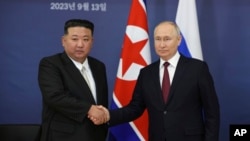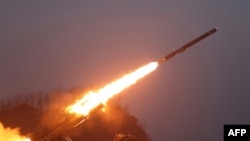China, dismayed by North Korea’s deepening military cooperation with Russia, could try to keep that relationship from disrupting regional stability for its own benefit rather than Washington’s, according to analysts.
Experts worry that North Korea could obtain weapons technology from Russia that would speed up Pyongyang’s missile and nuclear development programs to create a greater threat in the region.
The increasing belligerence of North Korean leader Kim Jong Un has exacerbated those concerns. He has ordered the country to be ready to occupy South Korea if war breaks out and canceled the reunification policy.
"We are deeply concerned about the growing relationship between Russia and the DPRK and what that might mean for Mr. Kim’s intentions," said a senior White House official on a background press call January 27 after talks between U.S. national security adviser Jake Sullivan and Chinese Foreign Minister Wang Yi. The acronym DPRK refers to North Korea's official name, the Democratic People's Republic of Korea.
"We raised those concerns directly with China, given their influence on Pyongyang," said the official.
Kim met with Russian President Vladimir Putin in Russia in September, possibly discussing ammunition North Korea could provide to support Russia’s war in Ukraine in exchange for technical help Pyongyang could receive from Moscow to hone its weapons.
Liu Pengyu, spokesperson for the Chinese Embassy in Washington, told VOA on Wednesday by email that he is "not aware of the cooperation between DPRK and Russia” and “has nothing to share" on the subject.
However, analysts said China could be concerned that any arms transactions between Putin and Kim could make the region more unstable.
"I suspect that Chinese worry that Putin is a disrupter and may be less interested in stability, is enabling Kim’s missile and nuclear program, and is more tolerant of Pyongyang’s provocative behavior," said Robert Manning, a senior fellow at the Stimson Center’s Reimagining U.S. Grand Strategy project.
"The combination of Kim’s aggressive hostility toward the U.S. and South Korea and diminished leverage makes [the Chinese] more concerned about stability, and we may see some modest cooperation with the U.S.," Manning told VOA by email.
China sees North Korea as a buffer state against U.S. forces stationed in South Korea. Beijing has been looking to maintain the status quo in the region.
Beijing is concerned that if Pyongyang increases its provocations using advanced weapons improved with Russia technology, it could invite stronger responses from the U.S., said Ken Gause, senior adversary analytics specialist at the Center for Naval Analyses.
"If the Russians could actually accelerate the timeline" for North Korea to enhance its nuclear missile capabilities to target the U.S. and "hold U.S. cities hostage with their weapons," then the United States would feel it necessary to "deal with the situation," Gause said.
"If North Korea basically draws the U.S. closer to the region, that’s not in China’s interest," Gause continued.
China already sees as a threat a package of nuclear deterrence measures that Washington and Seoul agreed at their summit in April.
John Erath, senior policy director at the Center for Arms Control and Non-proliferation, believes China will pursue its own interests with North Korea, regardless of any deal between Moscow and Pyongyang. And one of those interests, he told VOA, is "keeping the U.S. occupied and less likely to intervene in the case of a Taiwan crisis."
China claims sovereignty over the independent island nation of Taiwan, and Chinese President Xi Jinping vowed to reunite with the country in a speech delivered on New Year’s Eve.
Dennis Wilder, a senior fellow for the Initiative for U.S.-China Dialogue on Global Issues at Georgetown University, said, "If China uses its leverage on North Korea, it’s for its own purposes, not for the United States."
What Beijing wants "to avoid is another power leveraging North Korea and creating a problem for China in Northeast Asia. The Chinese prefer the status quo to anything else," continued Wilder, who served as National Security Council director for China from 2004-05.
What the United States wants out of China at this point, he said, "is probably information. I think the United States is trying to assess what is going on between North Korea and Putin."
He said a Chinese delegation that visited Pyongyang this week might have tried to find out from North Korea what its relations with Russia entails.
Chinese Vice Minister of Foreign Affairs Sun Weidong met with North Korean Foreign Minister Choe Son Hui on January 26 in Pyongyang, where the two agreed “to strengthen tactical cooperation and keep pace with each other to defend the common core interests,” according to North Korea’s state media KCNA.
On January 30, Russian Foreign Minister Sergey Lavrov and Chinese Vice Foreign Minister Ma Zhaoxu met in Moscow and discussed a "political and diplomatic solution" to "ease tensions on the Korean Peninsula," among other things, according to Russia’s Foreign Ministry.











